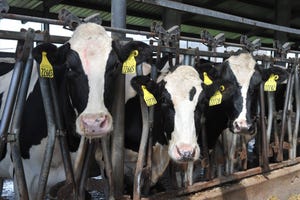Senate tackles ag spending bill

THE week after the House Appropriations Committee marked up its agricultural spending bill, the Senate Appropriations Committee marked up its own version, although some differences exist between the two bills.
Going line by line, many spending levels are roughly the same: Both offer $2.7 billion for agricultural research.
The House bill withholds 5% of the Agricultural Research Service's (ARS) funding until ARS takes certain steps in response to animal welfare concerns at its Nebraska research facility, while the Senate-approved manager's amendment contained nonbinding report language that directs ARS procedures to meet requirements of the Animal Welfare Act.
There is just a $5 million difference between the bills in the amount for the Animal & Plant Health Inspection Service. Both chambers allotted the Farm Service Agency approximately $1.5 billion for farm, conservation and emergency loan programs, while the Senate specifically prohibits closure of the agency's county offices.
Similar to the House, the Senate bill would extend a waiver of the whole grains requirement for school meals.
The Senate bill forces the U.S. Department of Agriculture to delay the removal of an import ban on beef from Brazil and Argentina.
Both versions left out a longtime spending bill rider to prohibit funding the Grain Inspection, Packers & Stockyards Administration from implementing a rule that supporters say provides fair markets and contract laws for livestock and poultry.
Sen. Lisa Murkowski (R., Alaska) obtained approval for her amendment requiring labeling for genetically engineered salmon. She downplayed concerns that labeling salmon would set a precedent for labeling biotech crops, saying, "Corn doesn't swim from one field to another and propagate with corn in another state. Fish move. Fish escape."
The Senate approved reinstituting a ban on funding inspections at horse slaughter facilities. Cattle groups had welcomed the omission of the horse slaughter ban in the House version, but senators approved the ban by a voice vote.
The Senate version seeks to limit the upcoming dietary guidelines from including environmental factors. It doesn't go as far as House funding bills that actually restrict which evidence the Administration can use in writing the recommendations. Instead, the Senate provision says the new guidelines should be "solely nutritional and dietary in nature and based only on a preponderance of nutritional and dietary scientific evidence and not extraneous information."
For the Conservation Stewardship Program — a conservation program on working lands — the Senate bill proceeds at the level dictated by the 2014 farm bill, while the House and President's budget both cut the program's funding. Environmental Quality Incentives Program levels were cut 18% in both the House and Senate bills.
The House bill includes a one-year delay in implementation of conservation compliance to receive crop insurance premium support; the Senate version does not.
Signup ended June 1, and USDA reported that as of July 10, more than 98% of farmers had turned in the proper forms.
The House has completed markups of all 12 of its spending bills within committee. Democrats have said they won't consider any spending bills for a full floor vote until an agreement can be reached to avoid sequestration. The new spending year is supposed to start Oct. 1.
Volume:87 Issue:27
About the Author(s)
You May Also Like





